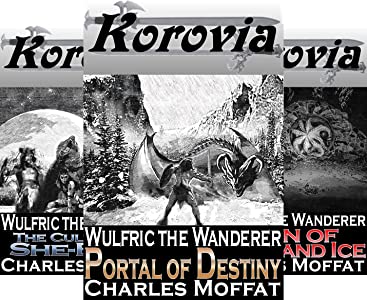"All Sword and Sorcery is Heroic Fantasy, but not all Heroic Fantasy is Sword and Sorcery."
Sword & Sorcery and Heroic Fantasy are two distinct subgenres within the broader fantasy genre. While they both share common elements and themes, they have notable differences in terms of tone, protagonists, narrative focus, and worldbuilding. Let's compare and contrast the two:
Sword & Sorcery:
- Tone: Sword & Sorcery tends to have a darker, grittier, and more morally ambiguous tone. It often explores themes of personal survival, individualism, and the use of power for personal gain.
- Protagonists: The protagonists in Sword & Sorcery stories are often antiheroes or morally complex characters. They are typically loners or mercenaries driven by personal motives rather than a grand sense of duty or heroism.
- Narrative Focus: Sword & Sorcery stories often focus on episodic adventures and self-contained narratives. They prioritize fast-paced action, thrilling combat, and intense encounters, with a focus on the exploits of the main character.
- Magic and Sorcery: Magic in Sword & Sorcery is usually depicted as dangerous, unpredictable, and often linked to dark forces. Sorcery and supernatural elements play a significant role, often presenting a corrupting influence on those who wield it.
- Worldbuilding: Sword & Sorcery settings are often portrayed as harsh and unforgiving, with a focus on smaller-scale conflicts and settings. The worldbuilding tends to be less extensive compared to Heroic Fantasy, with more emphasis on immediate surroundings rather than sprawling civilizations or grand quests.
Heroic Fantasy:
- Tone: Heroic Fantasy generally has a more optimistic and epic tone, emphasizing heroic deeds, noble virtues, and the triumph of good over evil. It often explores themes of heroism, destiny, and the battle between light and darkness.
- Protagonists: Heroic Fantasy typically features noble heroes driven by a sense of duty, honor, and the desire to save the world or protect the innocent. They often embark on grand quests and demonstrate self-sacrifice and unwavering courage.
- Narrative Focus: Heroic Fantasy tends to have a more overarching narrative structure, with a focus on the larger conflicts and the fate of entire worlds or civilizations. The stories may involve the gathering of allies, the fulfillment of prophecies, and the ultimate confrontation with a great evil.
- Magic and Sorcery: Magic in Heroic Fantasy is often portrayed as a mystical and awe-inspiring force. It can be used for both good and evil purposes, with powerful wizards or sorcerers playing significant roles in the story. Magic systems may be more detailed and intricately defined.
- Worldbuilding: Heroic Fantasy often involves extensive worldbuilding, creating vast and immersive settings with detailed histories, diverse cultures, and intricate political landscapes. The focus extends beyond individual characters, encompassing entire civilizations, mythical creatures, and complex social structures.
While Sword & Sorcery and Heroic Fantasy share common elements such as swords, magic, and fantastical creatures, their differing tones, protagonists, narrative focuses, and worldbuilding approaches distinguish them. Both subgenres offer unique experiences and cater to different storytelling preferences within the fantasy genre.











No comments:
Post a Comment
Comments containing links will be marked as spam and not approved.